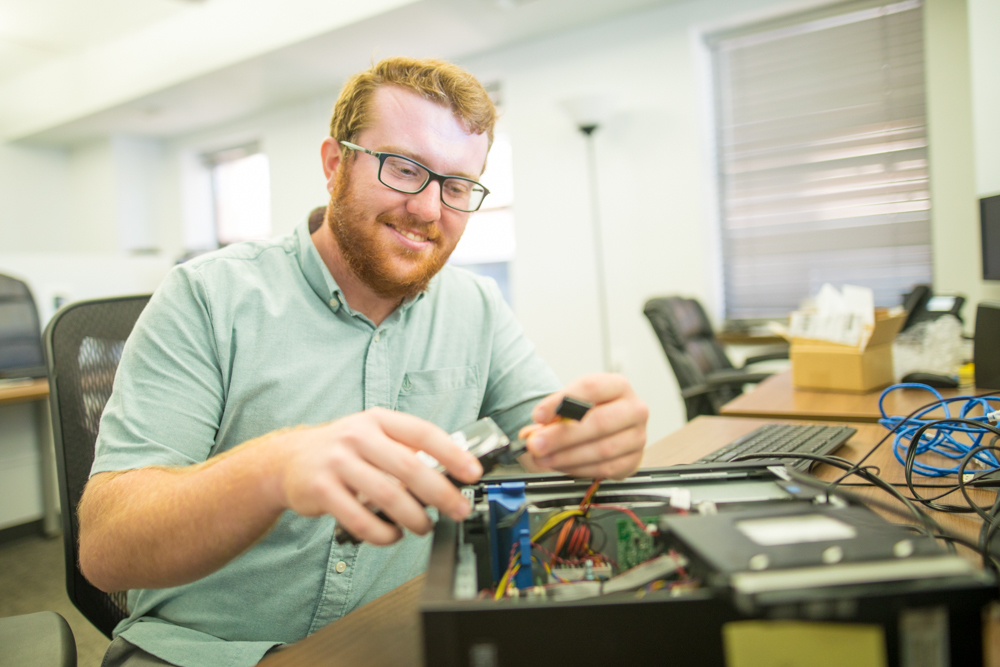When Riley Wesp changed his major from accounting to computer science after his sophomore year at Eastern Mennonite University, he wondered, amid enduring 18-credit-hour semesters necessary to graduate on time, if he’d made the right decision.
“There were definitely some lingering questions I had about whether I would be happy doing this in the future,” said Wesp, who juggled the change of major along with his commitment to the EMU Royals baseball team.
It didn’t take long though, once he arrived at EMU’s Washington Community Scholars’ Center this summer for a 10-week internship with IT firm Tech Impact to see those doubts disappear. Wesp will return for his senior year at EMU with the confidence that the IT field is indeed where his passions and talents lie.

That’s good news for Professor Kimberly Schmidt, who advised Wesp through the internship process, from the application and interview stages in the spring before he even arrived in Washington D.C. through the first hectic weeks of acclimation.
“Riley had a very successful internship and I’m thrilled,” Schmidt said. “His experience strengthens the partnership between Tech Impact and the WCSC. I look forward to future placements with Tech Impact.”
Working with an EMU alumnus
Tech Impact is one of several companies that have hosted WCSC students for internships in the IT field. In fact, Wesp’s supervisor for the summer was Francis Johnson, a 2007 graduate who also interned at Tech Impact while in the WCSC program. “I came here and never left,” he joked.
Johnson, now based in Philadelphia, Pennsylvania, is Tech Impact’s director of technology services.
The company began in 2003 as a partnership between Microsoft and several foundations to provide IT support for nonprofit clients. From several locations around the country, network technicians and staff help with an array of problems, from troubleshooting to general maintenance. The company also has several successful workforce training programs.
Over the summer, Wesp experienced the entire range of ways that technicians interact with clients from providing consultations by phone and Skype, to routing in remotely or making on-site visits.
A self-proclaimed “outgoing guy,” Wesp says he didn’t have any challenges with those interactions, but benefited from learning and practicing communication skills in a professional environment.
In just a short time, Wesp says he’s acquired “a ton” of new knowledge and the confidence to pursue both his final year of studies and a future in the profession.
“Working here has solidified that this is what I want to do in the future,” Wesp said. “I’ve loved it here and I’ve loved the people I’ve worked with. Every day, I learn something new. Now I can definitely see myself doing this 20 years down the road.”
Vocational guidance
The WCSC program is one way of fulfilling EMU’s cross-cultural requirement, but students also complete 14 units on topics related to vocational preparation and urban studies. Schmidt, along with Professor Ryan Good, teach courses and also mentor students in their new workplace environment. Program Assistant Karlyn Gehring is also an important contributor to day-to-day operations.
“One of our program goals is supporting the internship experience by facilitating reflection and engagement around where students want to go professionally, how they can get there, and what values they want to have shape those decisions,” Good said.
Wesp says he’s “definitely grown as a person,” stretched by the challenges of living with 13 other students in the Nelson Good House. Sharing a room with another student, and living with 11 more, has pushed him towards a greater awareness of what living in community means.
“I’ve really learned to pay attention, to work at understanding what people need and want so it can be better situation for all of us,” he said. One lasting memory, he said, is the two-day program retreat to Harper’s Ferry – a time to relax away from the city and “bond together” in ways he hadn’t expected.
